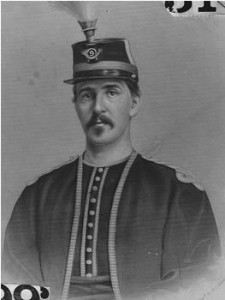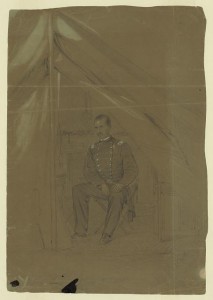This proclamation is a couple weeks old, but I give the Dispatch credit for playing it straight – after besmirching the good colonel as a “Lincoln Deputy”.
From the Richmond Daily Dispatch October 1, 1861:
Proclamation to the people of North Carolina by a Lincoln Deputy.
Headquarters, Fort Clark, N. C., September16, 1861.
To the People of North Carolina:
The Colonel commanding the Federal forces now in North Carolina, having heard of the erroneous impression which exists among the inhabitants as to the object and purpose of said forces, would state that it is no part of the object of said forces to pillage or plunder. We come not to destroy, but to secure place and uphold the laws of the United States.–The rights of property and persons will be respected and protected, and any Federal soldier infringing upon either will be very severely punished. It is no part of our intention to war against women and children.–On the contrary, they shall be protected with all the power under our control. Loyal citizens can enjoy their homes and property without the fear of molestation. No law will be abrogated or interfered with unless it comes in conflict with some law of the United States or the Constitution. All others will be obeyed and respected. It is with traitors and rebels in arms, who are destroying place and order, and inciting rebellion, that the Federal forces are to deal. We come to give you back law, order, the Constitution, your rights under it, and to restore peace. We call upon traitors and rebels in arms to lay them down, and upon good citizens, who respect the law, to aid us in our undertaking.
Rush C. Hawkins,
Colonel Ninth New York Volunteers,
Commanding Post.
There is a ton of information available about the New York 9th Infantry Regiment. Born in Vermont Rush Hawkins joined an army dragoon outfit at age 15 to serve in the Mexican war. In 1861 Hawkins
helped raise the 9th New York Infantry, a Zouave-styled regiment, popularly known as “Hawkins Zouaves” for service in the Civil War. Hawkins was appointed colonel of the regiment on May 4, 1861 and served with distinction in North Carolina early in the war. He was part of Benjamin F. Butler’s expedition to capture Fort Hatteras in 1861. Expecting to win a promotion to brigadier general for his service at Fort Hatteras he was instead relieved of command for insubordination. On October 8, 1861 a disgruntled Hawkins wrote “brigadier generals are made of such queer stuff nowadays, that I should not esteem it any great honor to be made one.” Hawkins would in fact receive a brevet promotion to brigadier general in 1865. Despite his belligerence an early dispatch of Hawkins’ caught the attention of President Abraham Lincoln. Hawkins was invited to the White House to confer with the President and General-in-Chief George B. McClellan. There he was instrumental in convincing the Union high command of the possibility of a combined operation against Pamlico Sound in North Carolina.


